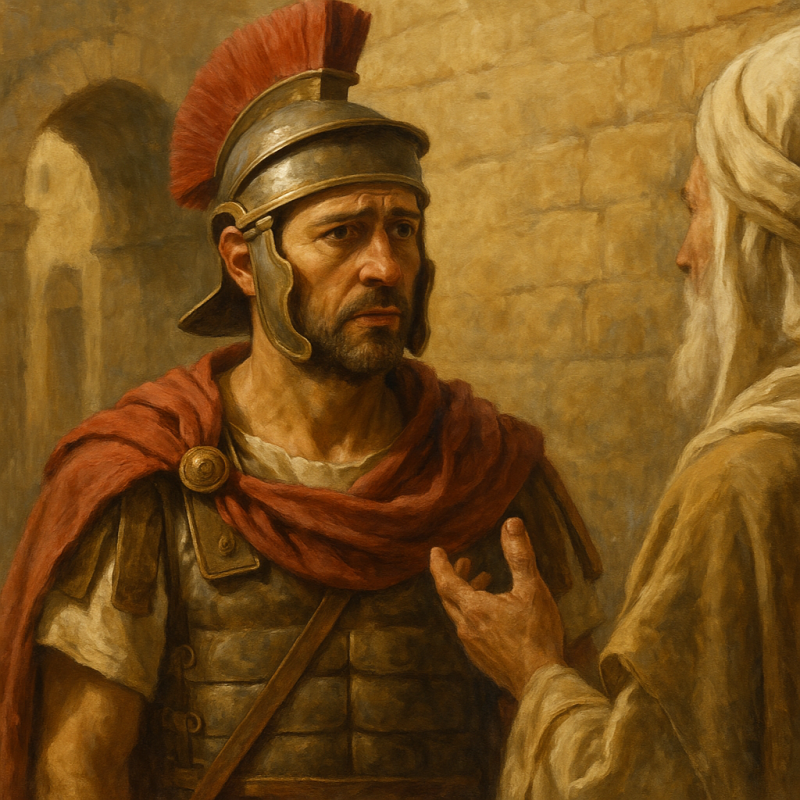
I find the centurion in Capernaum very special, and I believe we can learn a lot from him. In this study I want to briefly look at him and share a few lessons from his life, based on the Gospel of Luke. Let’s first read the story:
[1] Now when He concluded all His sayings in the hearing of the people, He entered Capernaum. [2] And a certain centurion’s servant, who was dear to him, was sick and ready to die. [3] So when he heard about Jesus, he sent elders of the Jews to Him, pleading with Him to come and heal his servant. [4] And when they came to Jesus, they begged Him earnestly, saying that the one for whom He should do this was deserving, [5] “for he loves our nation, and has built us a synagogue.” [6] Then Jesus went with them. And when He was already not far from the house, the centurion sent friends to Him, saying to Him, “Lord, do not trouble Yourself, for I am not worthy that You should enter under my roof. [7] Therefore I did not even think myself worthy to come to You. But say the word, and my servant will be healed. [8] For I also am a man placed under authority, having soldiers under me. And I say to one, ‘Go,’ and he goes; and to another, ‘Come,’ and he comes; and to my servant, ‘Do this,’ and he does it.” [9] When Jesus heard these things, He marveled at him, and turned around and said to the crowd that followed Him, “I say to you, I have not found such great faith, not even in Israel!” [10] And those who were sent, returning to the house, found the servant well who had been sick. (Luke 7:1–10)
Lesson 1: Reverence
The first thing I notice is that the centurion had reverence for Jesus. In those days, the Romans were in power, and the Jews had to obey them. This centurion could have used Roman law to force Jesus to come. He could have sent soldiers to fetch Him. But he did not do that. Instead, he sent Jewish elders to go to Jesus. And when he heard that Jesus was really coming, he sent friends with the message that he was not worthy for Jesus to enter his house.
This centurion did not treat Jesus as someone beneath him, but he saw that Jesus was greater than himself. We can learn from this: let us come to Jesus with reverence. We should live our lives in obedience to Jesus and give Him the highest place. Jesus is not just someone we call when we need help, like roadside service. We may have a relationship with Him every day and honor Him with our lives.
Lesson 2: Faith
The second lesson we can learn is faith. Jesus saw faith in the words of the centurion. The centurion fully believed that his servant would be healed if Jesus just spoke one word.
Imagine someone in your family is sick and Jesus would appear and say: “I will come with you to heal this person.” Would you say: “You don’t need to come, just say one word and it will be done”? Most of us would not dare to say that. But this centurion believed that one word was enough. We can also learn to grow to that level of faith: believing that one word from Jesus—spoken by the Holy Spirit or through the Bible—is enough.
Lesson 3: One word is enough
The centurion knew that one word from Jesus was enough. He believed Jesus didn’t need to pray for hours, fast, or bring a sacrifice to please the Father. He knew that Jesus had authority, and that one word from Him was enough to drive out sickness and demons.
In some deliverance ministries, people first have to fill out forms, fast for days, and pray for hours before anything is expected to happen. But that is not what we see here. One word, spoken with authority and faith, is enough to heal and set free.
Maybe you think: “That’s not how it works for me yet.” That’s okay. But it’s important to know: one word is enough. We can grow toward that kind of faith. If you believe that healing only comes after ten hours of prayer, then your faith will adjust to that idea. But if you know that one word is enough, then you also know that those ten hours are not needed. Maybe you are still in a place where you do need to pray longer, and that’s okay. As long as you know that you may grow toward faith that trusts one word is enough.
Lesson 4: Don’t trust in your own works
In verse 4 we read that the Jewish elders said this man deserved Jesus’ help because he loved the people and built a synagogue. Their way of thinking was: if someone has done good things, then he deserves a miracle. But that’s not how the Kingdom of God works.
Thankfully, the centurion thought differently. He didn’t say, “You have to come, because I deserve it.” No, he knew that he was not worthy, and that Jesus was much higher. He didn’t come based on his own deeds, but with humility and faith. We may also come to Jesus like this. Not to earn something, but to receive everything by grace. Everything we receive—healing, blessing, salvation—comes through faith and through God’s goodness. Not because we earned it, but because He is good.